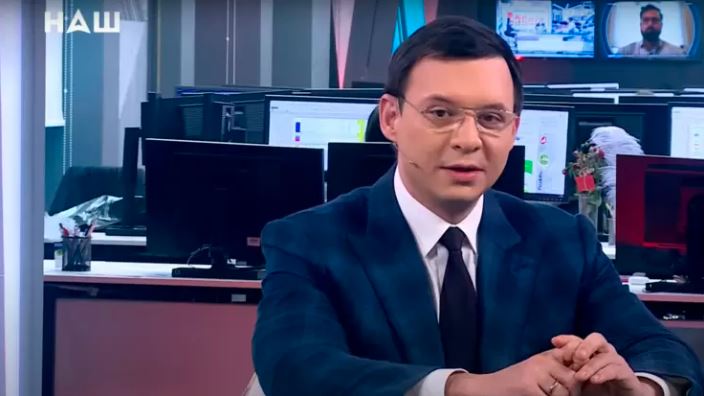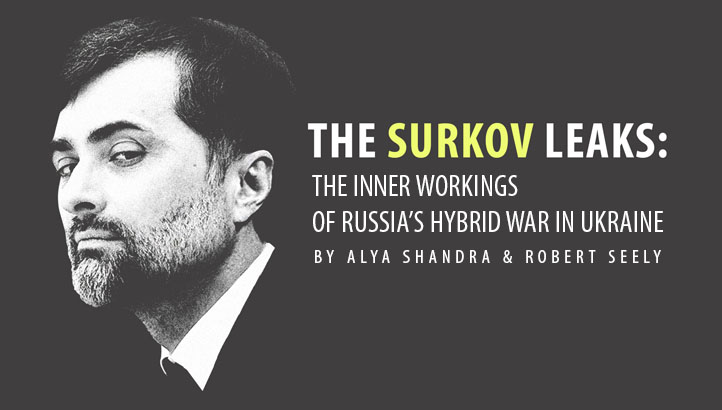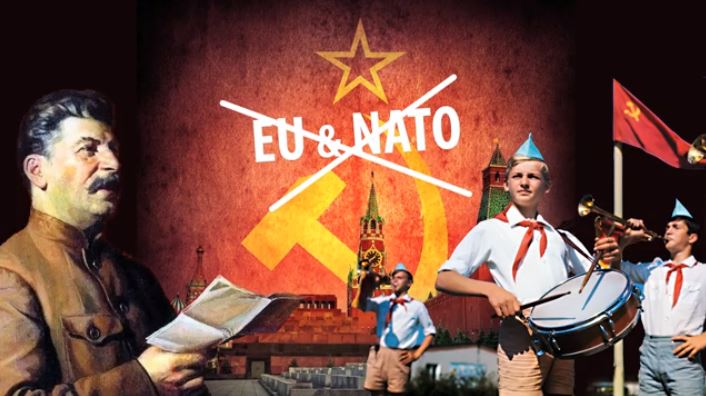The UK government’s revelations of a supposed planned pro-Kremlin coup elicited a great deal of sneering in Ukraine. After all, Yevhen Murayev is a pretty obscure politician with a rating in the single digits. The Opposition Bloc-For Life and its leader Yuriy Boiko are seen as the leading pro-Russian power in Ukraine, and then there’s that Putin crony Viktor Medvedchuk, who should be a far better candidate to lead a puppet government.
UK warns of Russian plan for coup in Ukraine. Here is what we know about its potential leader
MI-6 fantasies, said some, including Murayev himself (a remark must be made that the UK exposé was corroborated by sources in the US intelligence, so if fantasies are present, they are not Britain’s alone). The Kremlin has lost all touch with modern Ukraine if they think this can work, said others while making a cuckoo sign. Yet the third category warned against taking the UK announcement lightly: after all, was Aksyonov, whose pro-Russian party garnered 4.02% of the vote in 2010, a popular politician before he was installed as the head of occupied Crimea after Russia’s landgrab in 2014?
Peering into the Kremlin’s plans is a task involving a fair deal of guesswork, and thus eliciting all sorts of hypotheses from the layman without MI-6 intelligence sources. But there is a way to finesse our speculations: by basing them on empirical evidence of the Kremlin’s way of thinking and actions.
What Surkov’s hacked emails tell about Russia’s hybrid war against Ukraine
The greatest source of such empirical evidence is (arguably) the Surkov Leaks, three tranches of emails sent between 2013-2016 that escaped from the office of Putin’s top aide Vladislav Surkov thanks to Ukrainian hackers. In a RUSI paper co-authored by yours truly and UK MP Robert Seely, we dug through thousands of emails through which Russia waged its hybrid war against Ukraine to expose the Kremlin’s strategy and tactics all too often dismissed as absurd.
Let us view the idea of the “Murayev coup plot” through the prism of the Surkov leaks to answer two questions:
- Could the Kremlin have indeed been planning to install a pro-Russian government led by Murayev?
- Could the Kremlin’s plan of a Murayev-led-coup be really effective in Ukraine?
Could the Kremlin have indeed been planning to install a pro-Russian government led by Murayev?
In short, yes.
1. It could have been a Russian plan for a local invasion.
First, the UK report does not say the Kremlin planned to install Murayev as the president of current Ukraine. A more plausible option is a military takeover of a separate region and the installation of a local puppet government — basically, what happened in occupied Crimea and the currently-occupied occupied parts of the Donetsk and Luhansk oblast with the current so-called Donetsk and Luhansk “People’s Republics.”
2. Murayev comes from a region that is vulnerable to Kremlin influence and that has been a direct target of subversive activities.
Second, the Kharkiv Oblast, from where Murayev hails, is a prospective region for such an endeavor. It is this oblast that was one of the two main targets for a Russian intervention following the Euromaidan Revolution, the second one being the Odesa Oblast. Crucially, it was one of the few places outside the now-Russian-occupied Donbas where Russian flags were successfully hoisted above government buildings.
That Russia had a special interest in Odesa and Kharkiv oblasts was evident from intercepted conversations of Kremlin officials who discussed the plan of orchestrating “coups” in Kharkiv and Odesa on the background of pro-Russian demonstrations financed by the Kremlin.
Ukraine publishes video proving Kremlin directed separatism in eastern Ukraine and Crimea
The Russian spring plan ultimately failed. Today, Crimea and occupied Donbas remain as testimonies of the Kremlin’s tactics of setting up “alternative pro-Russian governments” in Ukraine.
But the Kremlin did not abandon its plans to subvert Ukraine. In the three tranches of the Surkov Leaks, the top Kremlin aide is seen focusing extensively on three regions: Kharkiv, Odesa, and Zaporizhzhia, where its networks of agents were strong.
Particularly, in the Kharkiv Oblast, during 2014-2016, Russia carried out the following campaigns, all aimed at creating an atmosphere of instability of the post-Euromaidan government:
- supported the (ulitmately, unsuccessful) electoral campaign of former Communist Party leader Alla Alekandrovska, who was a key figure in Russia's campaign for a soft federalization of Ukraine, campaigning for a "special economic status" of Kharkiv Oblast with the relevant changes being entered into the Ukrainian Constitution;
- funded fake protests at multiple enterprises, the workers of which demanded Ukraine "stop the war" (i.e. capitulate to Russia) and preserve economic relations with Russian regions;
- the leader of the NGO "Triunite Rus" conjured a multi-pronged campaign to "bring the ‘Russian world’ to Kharkiv," which included holding political protests (overtly and legally) and conducting sabotage (covertly and illegally) until such time as Kharkiv could be invaded from the occupied Donbas or the nearby Russian oblast of Belgorod. The action plan developed by the group included rallies, pickets, publishing "personal data" of "enemies," "a sticker war" advocating boycotting upcoming elections, and other activities to be implemented by local civic groups in an operation to be coordinated from Kharkiv and Moscow. The proposed campaign was followed up by a draft budget and reports indicating that at least part of the plan was implemented.
Crucially, these plans all had an ultimate goal: the development of a pro-Russian network of agents who would destabilize the region and penetrate its political life, with views for either:
- a military takeover of the region from Russia or occupied Donbas;
- the success of a pan-Ukrainian campaign for a "soft federalization" allowing for an even further Russian penetration and destabilization.
The last of the emails from Surkov Leaks are dated 2016. But there is no reason to believe that Russia's activities to subvert Kharkiv Oblast, or Ukraine, for that matter, stopped after that date.
Thus, the "Murayev coup plot" voiced by the UK government fits quite well into the Kremlin's history of operations: supporting political candidates in a vulnerable region either to get them into power and thus having a high-ranking agent, or indeed preparing the ground for a local invasion and establishment of a puppet government like in Crimea or Donbas.
3. There were many other plans that were under consideration. Including that of preparing for an invasion.
Crucially, the Kremlin worked on multiple projects at the same time. Some of them failed, some were not funded. Others were successful and were replicated in other regions. Surkov's office was, essentially, a well-oiled headquarters for the management of political projects to undermine Ukraine.
An example of a relatively mild proposal that did not come to fruition was that by Russian Duma deputy Markelov to create a pro-Russian electoral force in Kharkiv Oblast on the basis of a pro-Russian front group NGO called "Grazhdanskaya Initsiativa – Civic Initiative" that he created and remnants of the Party of Regions, the party of Ukraine's pro-Russian fugitive ex-President Yanukovych.
But yet another plan that did not come to fruition was one codenamed Troy, to lay the groundwork for overthrowing the authorities in the southeastern Zaporizhzhia Oblast, using existing agent networks and new proxy civic groups and at an estimated cost of $179,000. Developed by a commander of the Troy special forces detachment of the "Donetsk People's Republic," the plan outlines a campaign to prepare society of Zaporizhzhia Oblast for a Russian takeover. The plan included:
- activizing the agent network in the region and conducting intelligence on the political disposition;
- conducting campaigns to influence perceptions of the population (this inclluded creating new front groups, buying them representation in media, cooperating with local lawmakers and administrative workers, as well as local law enforcers);
- conducting protests against the war in Donbas (i.e. calling Ukraine to capitulate to Russia), as well as protests against the deteriorating social-economic situation;
- attacks on the pro-Ukrainian core, such as the leaders of the "Right Sector" and Euromaidan activists.
Although the plan was not carried out, the fact that it was sent to Surkov's office together with a detailed funding plan reveals that the Kremlin did not rule out the takeover of other Ukrainian regions after the occupation of Donbas and Crimea. It might very well be that such a plan existed also for Kharkiv.
4. The Kremlin had placed its bets on relative political outsiders before.
Do not be dissuaded by Murayev's relative marginality. The Surkov Leaks revealed that the Kremlin had placed its bets on other marginal political figures. It supported the abovementioned ex-Communist Alla Aleksandrovska's brand-new party that failed to pass the electoral threshold of 5%. And in eastern Ukraine, Murayev's prospects are better than the current national standing. While a recent poll revealed his current all-Ukrainian presidential rating is 6.5%, a poll conducted in the governmentally-controlled part of Donetsk Oblast (albeit by another pollster) revealed Murayev is the third-most-popular presidential candidate, polling at 14.8%.
Could the Kremlin's plan of a "Murayev-led-coup" be really effective in Ukraine?
Now that we've seen that the brief outline voiced by the UK government is realistic, let's address the question of whether these steps by the Kremlin could actually help the Kremlin achieve its goals of returning Ukraine to its orbit. Some analysts believe Ukraine is forever lost to Russia and that the Kremlin plan leaked by the UK testifies to the fact that the Kremlin is oblivious to the real situation in Ukraine.
I would like to warn those overly dismissive of the outlined plan that the Kremlin is not oblivious of the changes that took place in Ukraine after Euromaidan. But, unlike many pro-Ukrainian analysts, it does not consider them set in stone. Rather, it keeps on trying different approaches, using different actors, and continously searching for the "cracks in stone" which it attack to break apart Ukrainian unity. What is important, it keeps on diligently analysing, attempting different attempts to influence and wear out the resistance of Ukrainian society.
The unofficial polls of public opinion submitted to Surkov's office after Euromaidan were clear: the overtly pro-Russian agenda did not have a chance now in Ukraine. So other approaches were chosen: to attack the weaknesses of Ukrainian society, support pro-Russian politicians, create front groups, incite disagreements, push projects to break apart Ukrainian unity. This is all being done not without a strategy: the Kremlin is waiting for the right time to strike. As Serhiy Moiseiev, leader of the Kharkiv pro-Russian organization "Triunite Rus" outlined in 2014 in a letter forwarded to Surkov,
"When there is no fair wind, you still need to prepare the sails. Now it is important to fine-tune the coordination of the activists and create a government in exile... Create an official mouthpiece "Russian Voice of Kharkiv." A TV and website. Information occasions can be organized in Moscow, and connected with Kharkiv.
It is important to pull out the historical and cultural foundation from under the enemy: hold conferences, round tables, book presentations, debates, and so on. This will help consolidate the main team which is located in Moscow.
Attack all the weak points... the growth of crime, unemployment, inflation, social programs, medical care, education, ecology. In Pyatikhatki (the outskirts of Kharkov) a nuclear reactor was launched (as they say for scientific purposes). A secret American biological laboratory is being built in Merefa. Shale gas production (wells are being dug in Iziumskyi district) and so on. ...
When Kyiv itself will ripe for another revolution, we will have to take advantage of it. It is clear that Kharkiv residents are not morally ready to endure what the residents of Donbas are now experiencing. Therefore, the liberation of Kharkov should be almost bloodless.
Perhaps it will be a swift invasion of militia forces from , at a time when the junta in Kyivv is faced with a new Maidan or the threat of an invasion of Russian troops from the Sumy Oblast. ...
At this moment, the Kharkiv partisans and sabotage groups of [the "DNR" and "LNR"] should show the maximum activity to seize television centers and other strategic facilities, capture and neutralize demoralized junta activists. And our peaceful activists must bring out a mass of people to the meeting of the long-awaited liberators.
By that time, we should have fully formed our own power structure in the region and the city, so that Dobkin Kernes and others [...] have no more chance of returning to power."
This letter, although written in 2014 by an activist and submitted to Surkov's office, still demonstrates a logic which is likely still not off the table for Russia: to prepare the ground until a favorable moment arises to swiftly take over additional Ukrainian regions, adding them to its collection of pro-Russian "self-proclaimed republics."
And while that occasion is still to materialize, the Kremlin keeps making inroads into the Ukrainian political scene using the narratives that could be accepted at the moment. And they are by no means overtly pro-Russian. Rather, as Murayev's campaigning goes, they focus on the narrative of Ukraine's supposed "external governance" by the West and advocate for Ukraine's "independence," such as returning to a non-aligned status.
Of course, this "independence" in reality means to once more return under Russian subjugation.
The bottom line
During the eight years of an active hybrid war, the Kremlin keeps trying to gain back Ukraine with various means. Overtly pro-Russian narratives have been replaced with those advocating for Ukraine's "real" independence and calling to do away with the country's "external governance" by the West; they are relatively successful, with a December 2021 poll showing that 30.3% of respondents in Ukraine wish to do away with the country's "external governance" and 25% wish to restore economic ties with Russia. These form the basis of Murayev's political program, which poses as authentically "pro-Ukrainian," making him indeed a likely candidate for collaboration with the Kremlin, despite his claims to the contrary.
We have seen from hacked emails of a top Kremlin aide that after the Euromaidan revolution, Russia supported political projects and at the same time was open to considering plans of a military takeover of separate regions with the installation of a pro-Kremlin government there. It is likely that as the Kremlin continues to develop its strategy for bringing Ukraine back into the "Russian world," it will keep considering both options.
All of the above make it extremely likely that the UK revelations of a Murayev coup plot are real Kremlin plans, albeit certainly one of many. All of them have one goal: to subvert Ukraine by any means possible. A military invasion is only one of the options in Russia's arsenal of hybrid warfare, but if it does not materialize, that does not mean the threat is gone.
All of the above is worth keeping in mind for hybrid war analysts before any supposed Russian scenario is dismissed as outlandish.
Related:
- What Surkov’s hacked emails tell about Russia’s hybrid war against Ukraine
- UK warns of Russian plan for coup in Ukraine. Here is what we know about its potential leader
- Russian propaganda’s main message to Ukraine: you’re under “external governance” – study
- Why anti-Western conspiracies have inundated Ukraine
- Leaked Kremlin emails show Minsk protocol designed as path to Ukraine’s capitulation – Euromaidan Press report
</t.length;r++){if(t[r].contentWindow===e.source)t[r].style.height=e.data["datawrapper-height"][a]+"px"}}}))}();>








